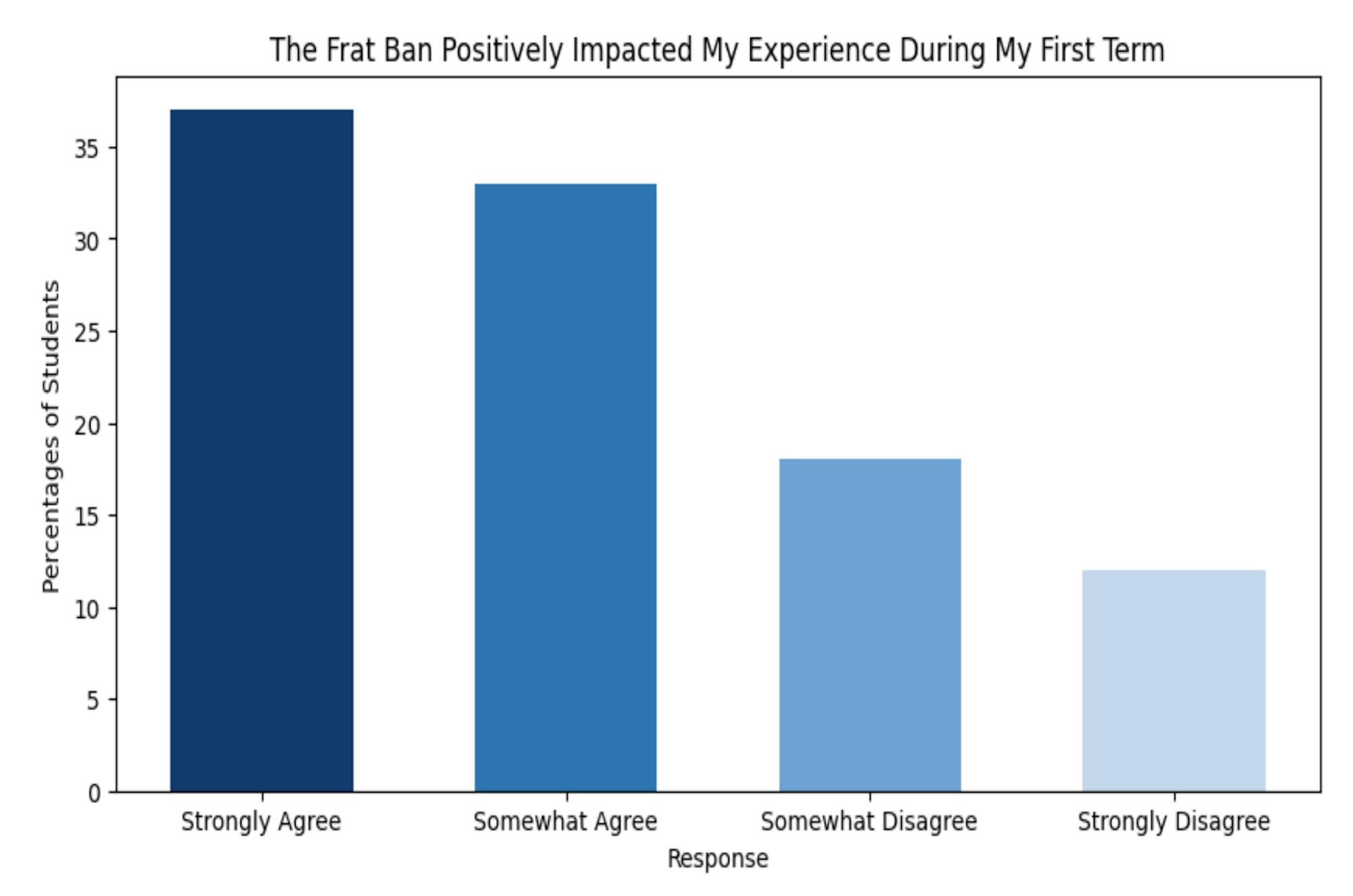At the end of fall 2023, The Dartmouth surveyed the Class of 2027 about their views on the fraternity ban, the College’s Greek First Year Safety and Risk Reduction policy, which restricts first-year students from attending events at Greek organizations for most of their fall term. Last fall, the Greek Leadership Council, in collaboration with College administration, permanently extended the ban until November 1, according to past reporting by The Dartmouth. The new rule guaranteed that first-year students are excluded from Greek spaces on Homecoming and Halloween weekends.
In an earlier survey of the Class of 2027, The Dartmouth found that 39% felt positively about the policy, 13% felt negatively and 48% remained neutral. This current survey expands upon these findings, focusing on the fraternity ban and allowing students to suggest ways to improve the policy.
The survey received 99 responses from first-year students, and the following three sections illustrate the results.
Impact on First Term Experience
In response to the first question, 70% of respondents agreed the frat ban is a positive element of the Dartmouth experience — with 37% agreeing strongly and 33% agreeing somewhat. A minority disagreed with the statement, with 18% disagreeing somewhat and 12% disagreeing strongly. Of students who strongly agreed or disagreed, students were almost three times more likely to strongly agree rather than strongly disagree. Overall, there is a significantly large population of students who believe that the fraternity ban positively impacted their first term.

Survey participants were also asked if they made new friends and connections as a consequence of the fraternity ban. The majority of participants, 80%, responded that they expanded their social circle, while only 20% felt that the ban restricted relationship growth. Among those who agreed, 49% agreed strongly while 31% agreed somewhat. Disagreement was split evenly, with somewhat disagree and strongly disagree each claiming 10% of the respondents. Moreover, 91% of students said they now recognize other first-years in Greek spaces — relationships that were built during the ban.
However, not all feedback was overwhelmingly positive. In response to being asked if they felt like they missed out on experiences in Greek spaces during the ban, 50% of respondents strongly or somewhat agreed with that claim.
An additional survey question indicated that more than 80% of the Class of 2027 spent most of their time in the “Fayesment,” which is the Mid Fayerweather basement, as well as off-campus houses and other first-year residence halls during the ban.
Post-Ban Outcomes

Respondents were asked whether they were worried about entering Greek spaces after the ban was lifted. In response, 67% of participants indicated that they were not worried, while 33% reported that they were. Among those who were worried, the most cited reasons for concern were a general fear of upperclassmen, comments on the social media app Fizz and stereotypes about fraternity drinking culture.
Nonetheless, a majority of first years, 63%, stated that they felt more comfortable when they eventually entered frats after the conclusion of the ban. Additionally, an overwhelming 88% of respondents indicated that they entered a Greek space after the frat ban ended.
Feedback on Policy Existence and Duration

The above chart shows that 84% of current first-year student respondents want the frat ban to continue in some form or another. However, this vote of confidence in the policy in general does not translate to complete approval of the ban’s current duration.

Although the GLC cited logistical and risk management challenges posed by both Homecoming weekend and Halloween weekend as the main motivation for the ban’s extension until Nov. 1, exacerbated by the influx of new members at many Greek chapters due to fall recruitment, the decision is relatively unpopular. In the survey, 61% of respondents indicated that they disagreed with the extension, and 79% responded that the frat ban should not have been extended. Of those in agreement that the ban should not be or have been extended, 51% strongly supported the statement.

The majority of freshmen surveyed, 54%, supported shortening the current length of the ban instead.
Methodology Notes:
At the end of the 2023 Fall Term, The Dartmouth fielded an online survey of first-year Dartmouth students on their opinions and experiences with the fraternity ban. The survey was sent out to 1,207 undergraduate students from the Class of 2027 through their school email addresses. The Dartmouth recorded 99 responses, resulting in an 8.2% response rate. Using administrative data from the College’s Office of Institutional Research, responses were weighted by gender and race/ethnicity. Weighting was done through iterative post-stratification (raking). Survey results have a margin of error ± 5.0 percentage points.




